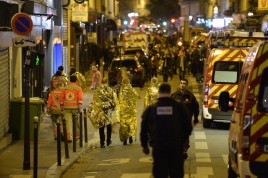
The 4th Annual Report on Terrorism and Radicalisation in Europe, drawn up by the Observatory on Radicalisation and Counter-Terrorism in Europe (ReaCT), run by Claudio Bertolotti, was presented on May 23. The Report (published by Start InSight) offers a comprehensive overview of the terrorist threat in Europe. In quantitative terms, it confirms that the rate of terrorist attacks has remained stable over the past three years. Europol sources (TeSat reports), Global Terrorism Index (Gti 2023)1 and the #ReaCT – Start InSight database show that Europe is ranked as the third most terrorist-affected region, behind Russia and Eurasia, Central America and the Caribbean, Bertolotti explained. EU member states, the UK and Switzerland were hit by 50 terrorist attacks of various kinds in 2022, down by a significant margin compared to 2021, when 73 terrorist attacks took place.
European landscape. Based on the above-mentioned sources, in the year 2022 1.5 per cent of those attacks were committed by radical left-wing movements ( a 43% drop compared to 2020, which, however, foreshadows a significant increase in 2023 owing to acts of terrorism committed by anarchist groups in Italy); 4 per cent were committed by far-right groups (7 % in 2020, thus confirming a downward trend since the years 2018-19); 24 per cent were committed by Jihadi groups (26 per cent in 2020). According to the “GTI – Global Terrorism Index 2023”, 19 out of 36 European countries progressed in the fight against terrorism over the past year. Only 14 of 45 attacks that took place in Europe in 2022 were traced to known terrorist groups, accounting for 21% of all attacks. In terms of casualties, Europe recorded 12 terrorism-related deaths in the year 2022, nine of which were linked to jihadist terrorism. Greece and France were the two most affected countries.
 The terrorists’ backgrounds. According to the Report, 89% of terrorist attacks in Europe in the period 2004-2022 were committed by immigrants, first, second and third generation, both documented and undocumented. A statistical correlation would thus exist between immigration and terrorism. However, the number of terrorists compared to the total number of immigrants is so small that this correlation loses its significance. In fact, the order of magnitude is one unit per one million immigrants. Out of a sample of 138 terrorists selected from the Start InSight database, 65 (47 per cent) were documented migrants; 36 (26 per cent) were second- or third-generation migrants; 22 (16 per cent) were undocumented migrants. The latter number is increasing and accounts for 32 per cent of all perpetrators in the year 2022. The number of European converts to Islam, constituting 6% of all terrorists, is likewise significant. Overall, 73% of all terrorists are legal residents, while the ratio of irregular immigrants to terrorists is 1:6. Moreover, 4% of terrorist attacks involved children/minors (7) among the attackers.
The terrorists’ backgrounds. According to the Report, 89% of terrorist attacks in Europe in the period 2004-2022 were committed by immigrants, first, second and third generation, both documented and undocumented. A statistical correlation would thus exist between immigration and terrorism. However, the number of terrorists compared to the total number of immigrants is so small that this correlation loses its significance. In fact, the order of magnitude is one unit per one million immigrants. Out of a sample of 138 terrorists selected from the Start InSight database, 65 (47 per cent) were documented migrants; 36 (26 per cent) were second- or third-generation migrants; 22 (16 per cent) were undocumented migrants. The latter number is increasing and accounts for 32 per cent of all perpetrators in the year 2022. The number of European converts to Islam, constituting 6% of all terrorists, is likewise significant. Overall, 73% of all terrorists are legal residents, while the ratio of irregular immigrants to terrorists is 1:6. Moreover, 4% of terrorist attacks involved children/minors (7) among the attackers.
The situation in Italy. The Report notes with regard to Italy that “Italian insurrectionary anarchists committed numerous non-lethal attacks over the past 25 years, including sabotage, arson and bomb attacks. Over the last few years (2022-2023), there has been a mounting wave of ‘insurrectionary anarchism’ in Italy, advocating revolutionary insurrection through illegal and violent action. This movement draws inspiration from the ‘ideological battle cry’ put forward by Alfredo Cospito, a convicted terrorist currently kept in solitary confinement under maximum security surveillance, (Article 41 bis). Mr Cospito’s radical views have galvanised and emboldened several national and international anarchist groups into resorting to violence as a means to achieve their goals. Cospito’s ideas are rooted in radical opposition to the State, capitalism and all forms of authority. This movement committed numerous non-lethal attacks, including sabotage, arson, bomb attacks and assaults, among others. While the attacks did not cause fatal injuries, the Report explained, they did inflict significant damage to property and disrupted the lives of many innocent people.” The growth of insurrectionary anarchism in Italy has grown into “a major security threat, and has since spread to other nations. The movement’s widespread use of violence and symbolic destruction has made it challenging for the law enforcement agencies to contain and prevent its activities. As Cospito and other extremists associated with him continue to gain influence, it is likely that the threat posed by insurrectionary anarchism will continue to grow in the coming years. This threat is now the most dangerous form of non-jihadist domestic terrorism in the country.
 Terrorist threat from the Balkans. Another terrorist threat concerning Italy comes from the Western Balkans, an area marked by Islamic radicalism and historically known as the ‘powder keg of Europe’. This region, reads the Report, counts approximately 8 million believers, members of different communities in terms of tradition and language, from which over a thousand citizens have left for the Middle East since 2012 to join Islamist militias, not only ISIS. Italy is subject to a so-called “instability arc” that starts in Sub-Saharan Africa and North Africa, reaches the Balkans and then extends towards the Near East, the Persian Gulf and Central Asia. The most serious challenges emanating from this vast area and threatening Italy’s national security include “illegal immigration, organised crime (drugs and weapons), regional crises, the proliferation of weapons of mass destruction, the problem of energy reserves and terrorism.” Italy’s strategies to counter these threats comprise, the Report explains, “the consolidation of internal stability in each Balkan country, including through active involvement in international missions, ensuring the proper performance of local political institutions, supporting the Euro-Atlantic integration of the region, preventing an upsurge of nationalistic movements, encouraging Italian trade and investment opportunities, and countering international terrorism, with special emphasis on Islamic terrorism – whose followers and recruits were often found in the Balkan region.”
Terrorist threat from the Balkans. Another terrorist threat concerning Italy comes from the Western Balkans, an area marked by Islamic radicalism and historically known as the ‘powder keg of Europe’. This region, reads the Report, counts approximately 8 million believers, members of different communities in terms of tradition and language, from which over a thousand citizens have left for the Middle East since 2012 to join Islamist militias, not only ISIS. Italy is subject to a so-called “instability arc” that starts in Sub-Saharan Africa and North Africa, reaches the Balkans and then extends towards the Near East, the Persian Gulf and Central Asia. The most serious challenges emanating from this vast area and threatening Italy’s national security include “illegal immigration, organised crime (drugs and weapons), regional crises, the proliferation of weapons of mass destruction, the problem of energy reserves and terrorism.” Italy’s strategies to counter these threats comprise, the Report explains, “the consolidation of internal stability in each Balkan country, including through active involvement in international missions, ensuring the proper performance of local political institutions, supporting the Euro-Atlantic integration of the region, preventing an upsurge of nationalistic movements, encouraging Italian trade and investment opportunities, and countering international terrorism, with special emphasis on Islamic terrorism – whose followers and recruits were often found in the Balkan region.”









